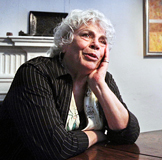
| NYWI HOME PAGE | VISITING WRITERS & EVENTS INDEX | VIDEO ARCHIVES | BLOG |
 |
CELEBRATED TRANSLATOR OF SPANISH LITERATURE, TO PRESENT NEW COLLECTION OF WORK BY THE “MOTHER OF MEXICAN LITERATURE
NYS Writers Institute, September 23, 2014
4:15 p.m. Seminar on translation | Assembly Hall, Campus Center, Uptown Campus
8:00 p.m. Reading | Assembly Hall, Campus Center, Uptown Campus
CALENDAR LISTING:
Edith Grossman, world-renowned translator into English of Gabriel Garcia Marquez, Mario Vargas Llosa and Don Quixote, will read from her new translation of works by Sister Juana Inés de la Cruz (1651-95), embattled nun, early feminist, and the “Mother of Mexican Literature,” on Tuesday, September 23, 2014 at 8 p.m. in the Assembly Hall, Campus Center on the University at Albany’s uptown campus. Earlier that same day at 4:15 p.m., the author will offer an informal seminar on translation in the same location. Free and open to the public, the events are sponsored by the New York State Writers Institute, and the UAlbany Department of Languages, Literatures and Cultures.
PROFILE
Edith Grossman, known for her translations into English of Gabriel Garcia Marquez, Mario Vargas Llosa and Don Quixote, is one of the world’s most admired translators working in any language. Critic Harold Bloom has proclaimed her “the Glenn Gould of translators.” Famously, the late Nobel Prize winner, Gabriel Garcia Marquez, declared that he preferred his own novels in English translation by Edith Grossman and fellow translator Gregory Rabassa than in the Spanish original. Writing in the New York Times, Mexican novelist Carlos Fuentes called Grossman’s 2003 translation of Don Quixote, “a major literary achievement.”
Grossman will read from her new translation of works by Sister Juana Inés de la Cruz (1651-1695), the embattled nun and early feminist who is widely acknowledged to be the “Mother of Mexican Literature.” Known during her lifetime as the “Tenth Muse” and the “Phoenix of Mexico,” Sister Juana was a child of illegitimate birth and a self-taught intellectual who rose to fame in Mexico City during the Spanish Golden Age. A champion of women’s education and literary expression, she was also condemned by Church authorities for “waywardness,” and was ultimately punished, publicly humiliated and assigned to do penance. In a forced renunciation of her activities she famously described herself as “I, the worst of all.”
The new book, Sor Juana Inés de la Cruz: Selected Works (2014) brings the power and intellect of Sister Juana to English readers. Novelist Ana Castillo said in advance praise, “Edith Grossman’s contemporary translation renders the contemplations, rhymes, and drama of la Décima Musa ageless.” Kafka translator Susan Bernofsky said, “Edith Grossman is a marvel. With the greatest artistry she has given vibrant, contemporary voice to Sor Juana… capturing the wit, tenderness, and religious fervor of her work.”
Grossman’s other translations of Spanish and Latin American writers include seven books by Gabriel Garcia Marquez, six books by Peruvian Nobel Prize winner Mario Vargas Llosa, and assorted books by Mayra Montero, Ariel Dorfman, Álvaro Mutis and many others. The reviewer for The Economist called her 2013 translation of Antonio Muñoz Molina’s In the Night of Time, “Sweeping, magisterial... An astonishingly vivid narrative.” Her 2011 translation of the notoriously difficult and hallucinatory masterpiece, The Solitudes, by Luis de Góngora (1561-1627), was praised by reviewers in the same extraordinary terms as her 2003 translation of Don Quixote.
Grossman is also the author of an acclaimed defense of translation as an imaginative art in its own right, Why Translation Matters (2010). Writing in the London Sunday Times, Edward King said, “In this slim but powerful volume, Edith Grossman argues that translation performs a function that is too often ignored or misunderstood.”
For additional information, contact the Writers Institute at 518-442-5620 or online at https://www.albany.edu/writers-inst.